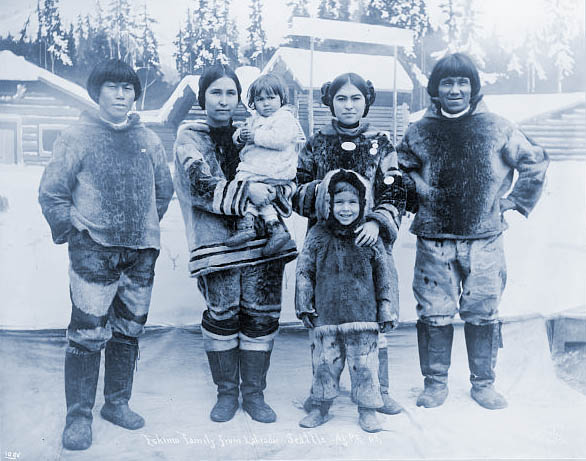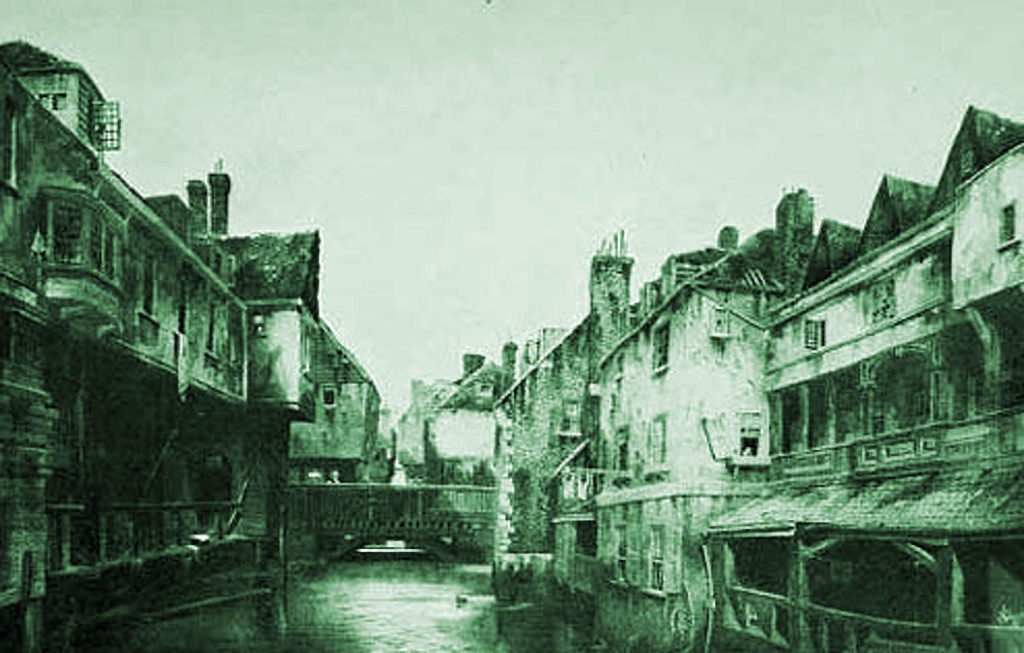 The children of the abyss is the subject of Chapter 23. Imagine growing up in a one room dwelling with your parents and siblings—no privacy, no room to accumulate possessions, to pursue interests, or even find rest unless the others were all at rest. Imagine living that way while eating poorly, little full protein like meat, eggs, milk, cheese, and few fresh green vegetables. The privy would be outside, and used by numerous others, perhaps never cleaned, its vault allowed to accumulate waste for years before being cleaned out. You are required to attend school between ages 5 and 10.
The children of the abyss is the subject of Chapter 23. Imagine growing up in a one room dwelling with your parents and siblings—no privacy, no room to accumulate possessions, to pursue interests, or even find rest unless the others were all at rest. Imagine living that way while eating poorly, little full protein like meat, eggs, milk, cheese, and few fresh green vegetables. The privy would be outside, and used by numerous others, perhaps never cleaned, its vault allowed to accumulate waste for years before being cleaned out. You are required to attend school between ages 5 and 10.
Here’s a little about the educational opportunities for children:
Compulsory education for children ages 5 to 10 began in 1870 with lots of exceptions available to parents who needed their children to work or who lived too far away from schools. Compulsory education for those ages became a much more serious effort in 1880, but the government didn’t truly fund it until 1891. In 1899 the ages for compulsory education were expanded to include children 5-12 years of age.
Just because education was compulsory, didn’t mean you actually attended school, because the financial pressures on your family might demand that you work.
Here’s a bit about the laws concerning child labor:
In 1814, compulsory apprenticeship by indenture was abolished. The first law to regulate child labor was passed in 1802 to limit the hours performed in a factory or mill to 12 per day. In 1819, a minimum age for child labor in factories was set at 9 years with a maximum of 12 hours per day. In 1847, the maximum hours were changed to 10 and that was also applied to women. Child labor was prohibited below the age of 10 in 1878.
 If you are a child of a poor family and you do go to school, you’ll have to make up the time away from work. You’ll probably do piece work in the evenings—work for which your parents would be paid by the piece—finishing clothes or preparing goods used in garment manufacturing or making things such as boxes, brushes, and a wide array of other small objects. That’s assuming your parents can find such work and that you are fast enough at it to make the wages earned worthwhile.
If you are a child of a poor family and you do go to school, you’ll have to make up the time away from work. You’ll probably do piece work in the evenings—work for which your parents would be paid by the piece—finishing clothes or preparing goods used in garment manufacturing or making things such as boxes, brushes, and a wide array of other small objects. That’s assuming your parents can find such work and that you are fast enough at it to make the wages earned worthwhile.
Once you’re 13 years old you either find a way to earn a living in the streets or find a job. If you’re still relatively small, you have the advantage over adults looking for work when it comes to labor that must be done in tight spaces. You’ll get paid less than an adult, but at least you have a job, right? If you are sufficiently malnourished that your growth has been stunted, you are even better off. You can work in a mill, where you can access parts of the steam-powered machinery that larger human beings can’t reach. Be careful not to get any body parts caught in the machinery. You can work as a chimney sweep and crawl inside flues to clean them out. Don’t get stuck. Your livelihood depends on your ability to squirm in and out with a minimum of time and effort. You must be efficient! If the city has nothing for you, then off you go to the mines that have very tight passages.
 Upon reflection, perhaps the streets are a better idea. You could become a shoeblack and polish the shoes of those who can pay. Perhaps you could run a coster’s barrow on the street, selling food or other items, offer shoe repair or the services of a locksmith. Still, your earnings are poor and the rents keep going up. You’ve left your family and now live with others teens in tight spaces, perhaps in an abandoned, condemned building. A life of crime is beginning to look attractive. And, of course, if all else fails, you can beg on the streets as long as the local police don’t catch you or are sufficiently compensated to look the other way. One day, a chrismatic boy joins the ranks of your friends, and shows some initiative. “Some children perform as acrobats in traffic,” he says, “risking injury to thrill audiences and perhaps earn a gratuity.”
Upon reflection, perhaps the streets are a better idea. You could become a shoeblack and polish the shoes of those who can pay. Perhaps you could run a coster’s barrow on the street, selling food or other items, offer shoe repair or the services of a locksmith. Still, your earnings are poor and the rents keep going up. You’ve left your family and now live with others teens in tight spaces, perhaps in an abandoned, condemned building. A life of crime is beginning to look attractive. And, of course, if all else fails, you can beg on the streets as long as the local police don’t catch you or are sufficiently compensated to look the other way. One day, a chrismatic boy joins the ranks of your friends, and shows some initiative. “Some children perform as acrobats in traffic,” he says, “risking injury to thrill audiences and perhaps earn a gratuity.”
What I’m suggesting here is an early life much like that of the character Frederick Bledsoe in my novel The Surgeon’s Mate : A Dismemoir. Here’s an excerpt:
Simon eventually took their act to the streets around Leicester Square. Instead of scampering about in ruins, they performed in the road. Again, two boys gaped, pointed, and called attention, while their fellows dashed about among the traffic. Frederick and his pals leapt through the gap between the legs of walking and trotting horses or the wheels of carriages in motion. They capered over the backs of horses, climbed moving carriages and wagons, leapt from one vehicle to another, deftly avoiding the whips and swats of the drivers. Gripping spokes, they cartwheeled down the road attached to hansoms and growlers. If those driving or riding the conveyances became upset, or if a constable got involved, so much the better. The two boys calling attention to their fellow’s feats also solicited donations. During times when crowds made their way to various performances at the square, the earnings doubled.
Among the Regal Rats, Simon’s greatest competition for the boldest, most daring feats had always been Frederick. The two worked out increasingly dangerous street antics. With a sense that the larger society had tossed him away and preferred to ignore him, Frederick continued to feed on the attention he got. His goal was to shock audiences into remembering him. His craving for the attention grew so strong that he pushed Simon for more.
“Let’s set up for the crowds leaving the halls as well,” Frederick said.
“Too dangerous after dark,” Simon said. “Not enough light, and you know how the pavers sweat once the sun goes down.”
“We’ll be more careful.” Frederick turned to the other boys to make an appeal. “We can do it for the money, can’t we, Rats?”
He’d touched upon a motivating force. The boys were doing better than ever keeping themselves housed and fed, but they wanted more comfort. Currently, they sat around an abandoned saw mill where they slept at night. The business had closed down after a fire burned half the structure.
“Bertram and I found lodgings in Great Windmill Street as might take us all,” Alex said. “We just need enough chink.”
“Winter is coming,” Quint said. “Would be nice to have a warm place.”
Several of the others nodded hopefully.
“Squint, he always complains when the weather turns cold,” Simon said. He waved his hand in the air as if he could dismiss the idea entirely with one gesture. A long silence followed while the Regal Rats continued to gaze at their leader. Simon clearly became uncomfortable. “We’d be too tired out to do another show so late,” he protested. “That and the dark—I won’t lead you boys into harm.”
“Well,” Frederick said, “if you’re frightened…”
Finn poked at Simon with a look of challenge.
“Come on,” Alex said. “Like Freddy says, we can do it.”
Simon glared at Frederick, yet reluctantly agreed to do a street performance the evening of the following Saturday.
When the day came, the chill fall weather had left moisture on the paving stones. The air had become still. A haze of coal smoke hung over the Leicester Square area. As the audiences attending performances exited the theaters and music halls, the pall of smoke seemed to dampen their mood. The Regal Rats’ antics in the road were largely ignored.
“Walk the wheel,” Frederick said to Simon. “That always gets the crowd excited.”
Simon frowned. The leader of the Regal Rats was the only one among the group who could balance on the moving wheel of a hansom cab. The feat required a carriage moving at just the right pace, and a confederate to draw the driver’s attention to the right side of the vehicle, while Simon mounted the left wheel and took rapid steps on top of the turning rim. He dropped off the wheel onto the pavement as soon as the driver noticed him. Although the action didn’t last long, those watching loved the feat, and it always increased their earnings.
Simon shook his head. “Too dangerous.”
“Is that all you have for us tonight,” Frederick asked, “cowardice?”
Several of the boys watched to see what Simon would do. Their leader looked up and down the lane. His eyes fixed on a hansom cab approaching from the south. “Squint,” he said, “you catch the driver’s eye.”
Simon spit on the pavement at Frederick’s feet, then scampered with Quint into the road to meet up with the cab. As the carriage came close, Finn and Alex did their best to draw the attention of the crowd moving along the footway to the action in the street. Frederick saw the head of the hansom driver turn toward the right. Simon made his move, grabbing spokes near the rim and allowing their movement to pull him up onto the wheel. In a fluid motion Frederick had never been able to get right, Simon found his feet on the wheel rim, facing the direction the carriage traveled, and began walking backwards in rapid, mincing steps. Gasps, oohs, and aahs from the crowd on the footway drew the driver’s attention back to the left.
The man was quick. Seeing Simon, he struck him with his whip.
Frederick had seen Simon dodge whips many times, and didn’t want to believe his eyes as he watched his friend stumble. Simon’s face reflected confusion and frustration. His arms pinwheeled briefly as he fell in front of the wheel. The rim passed over Simon’s neck, and the carriage kept going. Those watching on the footway flooded into the road, surrounding the broken boy, and obscuring Frederick’s view. That was the last he saw of Simon.
Frederick experienced a pang of loss that reminded him so much of what he’d known when his mother died that he immediately pushed the feeling aside, and walked away.
~ ~ ~
In the days that followed, the Regal Rats looked at him with scorn. Even so, he tried to lead them. Their performances lacked a certain vitality. They had lost their spirit. None of them had the charisma to gather much of an audience. Frederick told himself that Simon’s death wasn’t his fault, but fearing that he deserved to be the next to fall maimed or dead, he quit the street company.
He returned to scavenging for a living. Trying to find a position in industry at age fifteen, he found that he’d become too large to perform most child labor, and wasn’t considered mature and trustworthy enough for an adult job. He worked as a pure finder, selling dog shit to tanneries, and tried his hand as a tosher in the sewers beneath the city. Once he’d had enough of going hungry, he lied about his age and joined the Royal Navy.
 The excerpt above is from a part of The Surgeon’s Mate: A Dismemoir that takes place in the 1870s when childhood for the poor in London was certainly fraught with dangers, pains, and difficulties. By 1902, the likelihood of good in a pauper’s childhood had not become better, and was probably most often much worse.
The excerpt above is from a part of The Surgeon’s Mate: A Dismemoir that takes place in the 1870s when childhood for the poor in London was certainly fraught with dangers, pains, and difficulties. By 1902, the likelihood of good in a pauper’s childhood had not become better, and was probably most often much worse.
At the end of the chapter 23 in The People of the Abyss, Jack London reveals his bigotry when he writes:
In London the slaughter of the innocents goes on on a scale more stupendous than any before in the history of the world. And equally stupendous is the callousness of the people who believe in Christ, acknowledge God, and go to church regularly on Sunday. For the rest of the week they riot about on the rents and profits which come to them from the East End stained with the blood of the children. Also, at times, so peculiarly are they made, they will take half a million of these rents and profits and send it away to educate the black boys of the Soudan.
I’m not suggesting that he’s not right to point out the odd priority of helping people on the other side of the world before helping those who suffered at home, but by pointing out that those of Soudan are black he leaves a clear impression that he believes they are less worthy. Other bigoted statements the author made in his writing during his lifetime make it clear that he indeed was a racist.
—Alan M. Clark
Eugene, Oregon
Get a free ebook copy of The People of the Abyss from Project Gutenburg—available in various formats including Kindle and Epub, : http://www.gutenberg.org/ebooks/1688
Preorder A Brutal Chill in August 
Visit Alan M. Clark online: www.alanmclark.com
About Alan M Clark 
Author and illustrator, Alan M. Clark grew up in Tennessee in a house full of bones and old medical books. His awards include the World Fantasy Award and four Chesley Awards. He is the author of seventeen books, including ten novels, a lavishly illustrated novella, four collections of fiction, and a nonfiction full-color book of his artwork. Mr. Clark’s company, IFD Publishing, has released 44 titles of various editions, including traditional books, both paperback and hardcover, audio books, and ebooks by such authors as F. Paul Wilson, Elizabeth Engstrom, and Jeremy Robert Johnson. Alan M. Clark and his wife, Melody, live in Oregon. www.alanmclark.com
 The last chapter of The People of the Abyss is titled “The Management.” In it, Jack London compares the health, happiness, and personal wealth of the average Londoner of 1902 to that of the average Inuit of Alaska of the time, and concludes that those living in the more primitive setting enjoy a much better life than do those of the most sophisticated society on the planet. Since, as he says, civilization has increased man’s productivity such that one working man can produce for many, he concludes that mismanagement is the problem—indeed, criminal mismanagement.
The last chapter of The People of the Abyss is titled “The Management.” In it, Jack London compares the health, happiness, and personal wealth of the average Londoner of 1902 to that of the average Inuit of Alaska of the time, and concludes that those living in the more primitive setting enjoy a much better life than do those of the most sophisticated society on the planet. Since, as he says, civilization has increased man’s productivity such that one working man can produce for many, he concludes that mismanagement is the problem—indeed, criminal mismanagement.




















